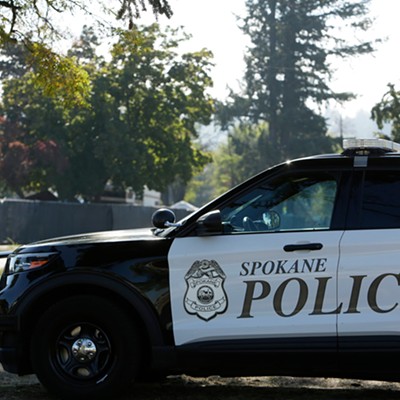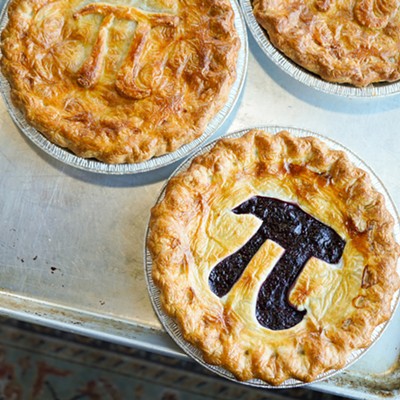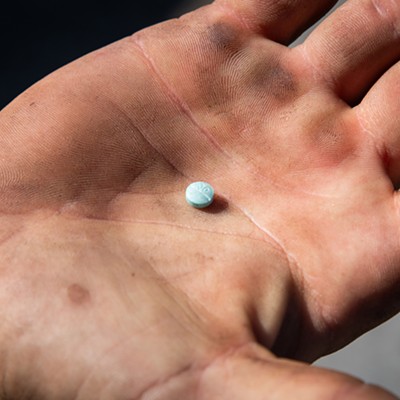In Brief
[
{
"name": "Broadstreet - Instory",
"insertPoint": "5",
"component": "25846487",
"requiredCountToDisplay": "5"
},{
"name": "Broadstreet - Instory",
"insertPoint": "10",
"component": "25846487",
"requiredCountToDisplay": "10"
},{
"name": "Broadstreet - Instory",
"insertPoint": "15",
"component": "25846487",
"requiredCountToDisplay": "15"
},{
"name": "Broadstreet - Instory",
"insertPoint": "20",
"component": "25846487",
"requiredCountToDisplay": "20"
}
]
by Inlander Staff
Vandals Charging -- COEUR D'ALENE -- The University of Idaho is reporting high enrollment numbers, and the campus in Coeur d'Alene has seen by far the highest influx as the number of students grew from 502 last year at this time, to 531 this semester.
"The biggest increase is in the number of degree-seeking students," says Jack Dawson, dean of the University of Idaho's campus in the Lake City. "Citizens of the Panhandle are increasingly aware of the scope and quality of what we have to offer here." He adds that the strong programs in education, psychology and engineering especially have pulled students onto the Coeur d'Alene campus.
Statewide, UI enrollment is up by 4.2 percent to a total of 12,446 students, marking the first time more than 12,000 students have been enrolled in spring.
Among other developments, the UI School of Communication is in the middle of a transition to a more focused School of Journalism and Mass Media. The new school will seek accreditation from the Accrediting Council on Education in Journalism and Mass Communication by 2005. No other journalism program in Idaho has this accreditation.
One Spokane -- SPOKANE -- May's One Spokane Summit raised the issue of poverty in the city, but many are still wondering what actually came out of the efforts.
Robin Toth, economic development project manager for the city, says much of what's been happening so far is groundwork. The City Council has already approved $20,000 to fund One Spokane, but Toth says the mayor is also working on putting together a fundraising campaign for the project.
"We did have a number of private businesses who contributed over the last year. We are looking at writing some grants and going out to some foundations," Toth says.
Here are a few other updates on the One Spokane project:
The One Spokane joint committee, consisting of city representatives and community members, will be assembled. It is responsible for examining public policies and making recommendations for changes that will aid in the abatement of poverty.
A One Spokane program coordinator will be named soon. This person will report directly to the mayor and be responsible for publicity, fundraising, special events, research and support for the joint committee.
"All the information is being pulled together," Toth says. "Interns and volunteers are working hard to compile databases from which to work from, so when committees get going, they'll have all the information at their fingertips."
Healthy Snack Attack? -- OLYMPIA, Wash. -- The Children's Alliance is sponsoring a bill that would eliminate the sale of junk food on public school grounds.
"This isn't a radical idea. We're saying that vending machines at our children's schools should be stocked with healthful foods, not junk food," says Shelley Curtis, nutrition outreach and food policy manager at the Alliance. "Growing children need all the nutrients they can get."
Revenues from school vending machines go to support school programs, and some fear that a switch to healthy snacks, such as fruit and pretzels, would seriously cut the popularity of the vending machines. The irony is that the number of overweight and obese children is higher than ever before, yet schools enable the same children to buy junk food in support of the school band and the chess club.
"It's a noble intent on behalf of the Children's Alliance, but there could be some challenges," says Doug Wordell, director of nutrition services in Spokane Public Schools. "The revenue from the vending machines does go to the school activity director for programs and band uniforms." If passed, the bill would create a task force to deal with revenue losses.
Wordell says that Spokane school district's vending machines have candy-type items, chips and "other foods of minimal nutritional value. Some of our schools have pop machines," Wordell continues. "If they have one of those, they also have a juice and a water machine. Few schools have snack machines, and they are not as profitable as the pop machines."
There are no student vending machines in grade schools, says Wordell.
The Alliance estimates that 20 states have already restricted junk food sales in schools. One high school in San Diego did make the switch to healthy snacks as an experiment and reported that profits doubled. "We have to reject the notion that kids hate healthful foods," says Curtis.
Publication date: 02/06/03
Vandals Charging -- COEUR D'ALENE -- The University of Idaho is reporting high enrollment numbers, and the campus in Coeur d'Alene has seen by far the highest influx as the number of students grew from 502 last year at this time, to 531 this semester.
"The biggest increase is in the number of degree-seeking students," says Jack Dawson, dean of the University of Idaho's campus in the Lake City. "Citizens of the Panhandle are increasingly aware of the scope and quality of what we have to offer here." He adds that the strong programs in education, psychology and engineering especially have pulled students onto the Coeur d'Alene campus.
Statewide, UI enrollment is up by 4.2 percent to a total of 12,446 students, marking the first time more than 12,000 students have been enrolled in spring.
Among other developments, the UI School of Communication is in the middle of a transition to a more focused School of Journalism and Mass Media. The new school will seek accreditation from the Accrediting Council on Education in Journalism and Mass Communication by 2005. No other journalism program in Idaho has this accreditation.
One Spokane -- SPOKANE -- May's One Spokane Summit raised the issue of poverty in the city, but many are still wondering what actually came out of the efforts.
Robin Toth, economic development project manager for the city, says much of what's been happening so far is groundwork. The City Council has already approved $20,000 to fund One Spokane, but Toth says the mayor is also working on putting together a fundraising campaign for the project.
"We did have a number of private businesses who contributed over the last year. We are looking at writing some grants and going out to some foundations," Toth says.
Here are a few other updates on the One Spokane project:
The One Spokane joint committee, consisting of city representatives and community members, will be assembled. It is responsible for examining public policies and making recommendations for changes that will aid in the abatement of poverty.
A One Spokane program coordinator will be named soon. This person will report directly to the mayor and be responsible for publicity, fundraising, special events, research and support for the joint committee.
"All the information is being pulled together," Toth says. "Interns and volunteers are working hard to compile databases from which to work from, so when committees get going, they'll have all the information at their fingertips."
Healthy Snack Attack? -- OLYMPIA, Wash. -- The Children's Alliance is sponsoring a bill that would eliminate the sale of junk food on public school grounds.
"This isn't a radical idea. We're saying that vending machines at our children's schools should be stocked with healthful foods, not junk food," says Shelley Curtis, nutrition outreach and food policy manager at the Alliance. "Growing children need all the nutrients they can get."
Revenues from school vending machines go to support school programs, and some fear that a switch to healthy snacks, such as fruit and pretzels, would seriously cut the popularity of the vending machines. The irony is that the number of overweight and obese children is higher than ever before, yet schools enable the same children to buy junk food in support of the school band and the chess club.
"It's a noble intent on behalf of the Children's Alliance, but there could be some challenges," says Doug Wordell, director of nutrition services in Spokane Public Schools. "The revenue from the vending machines does go to the school activity director for programs and band uniforms." If passed, the bill would create a task force to deal with revenue losses.
Wordell says that Spokane school district's vending machines have candy-type items, chips and "other foods of minimal nutritional value. Some of our schools have pop machines," Wordell continues. "If they have one of those, they also have a juice and a water machine. Few schools have snack machines, and they are not as profitable as the pop machines."
There are no student vending machines in grade schools, says Wordell.
The Alliance estimates that 20 states have already restricted junk food sales in schools. One high school in San Diego did make the switch to healthy snacks as an experiment and reported that profits doubled. "We have to reject the notion that kids hate healthful foods," says Curtis.
Publication date: 02/06/03



















